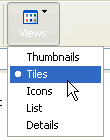Lesson 7: Working with Windows Explorer
/en/windowsxp/files-folders-and-drives/content/
Introduction
By the end of this lesson, you should be able to:
- Discuss My Documents, Windows Explorer, and My Computer
- Navigate files, folders, and drives
- Move files and folders
- Copy files and folders
- Select more than one file or folder
Introduction to My Documents
My Documents is a folder that provides you with a convenient place to store your important files and folders. Remember, you can quickly reach My Documents in the Start menu or by double-clicking the My Documents icon on your desktop.
The My Documents folder looks something like the example below:
My Documents includes a few default subfolders called My Music, My Pictures, and My Videos. Feel free to use, rename, or delete these folders.
Exploring Windows Explorer
Windows Explorer is a file management tool that lets you create, rename, and delete folders. It also allows you to copy, print, move, delete, rename, and manage files.
To open Windows Explorer:
- Open My Documents.
- Click the Folders button on the Navigation toolbar.
- A list of folders opens in the left pane.
To explore Windows Explorer:
- With Windows Explorer open, scroll until you see the Control Panel icon in the left pane.
- Click the Control Panel icon. The contents (of the Control Panel folder) display in the right pane.
- Practice viewing other folders in the list.
- To close Windows Explorer, click the small black X in the upper right of the list OR click the Folder button.
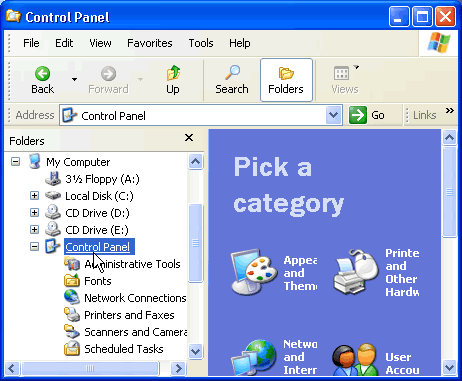
Exploring My Computer
My Computer is another tool you can use to manage files and folders. With this tool, you can create, rename, and move folders and copy, print, move, delete, and rename files. It also allows you to gain access to other system tools.
To open My Computer:
- Double-click the My Computer icon on the desktop.
- My Computer opens.
OR
- Right-click the My Computer icon (on the desktop).
- Choose Open.
OR
- Open the Start menu and choose My Computer.
Copying files and folders
Windows offers several ways of working with files and folders. Copying and moving are two useful techniques.
To copy a file or folder:
- Open My Documents. Locate the file or folder you want to copy in My Documents or its subfolders.
- Click the file or folder you want to copy. The file or folder darkens when you select it.
- Under File and Folder Tasks, click Copy this file or Copy this folder.
- In the Copy Items dialog box, select the place where you want to copy the file or folder.
- Click the Copy button.
OR
- Choose Edit
 Copy (Ctrl + C).
Copy (Ctrl + C).
OR
- Right-click the file or folder and choose Copy.
THEN
- Locate the file or folder you want to copy and choose Edit
 Paste (Ctrl + V).
Paste (Ctrl + V).
OR
- Right-click the file or folder and choose Paste.
Moving files and folders
Moving files and folders is relatively easy using My Computer or Windows Explorer.
To move files and folders:
- Open My Documents. Locate the file or folder you want to move in My Documents or its subfolders.
- Click the file or folder you want to move. The file or folder darkens when you select it.
- Under File and Folder Tasks, click Move this file or Move this folder.
- In the Move Items dialog box, select the place where you want to move the file or folder.
- Click the Move button.
OR
- Choose Edit
 Cut (Ctrl + X).
Cut (Ctrl + X).
OR
- Right-click the file or folder and choose Cut.
THEN
- Locate the file or folder you want to copy and choose Edit
 Paste (Ctrl + V).
Paste (Ctrl + V).
OR
- Right-click the file or folder and choose Paste.
Selecting more than one file or folder
You may need to copy or move multiple files and folders.
To copy or move more than one file or folder:
- Hold down the Ctrl key, then click to select the files or folders you want to move or copy.
- The files or folders darken as they are selected.
- Copy or move the file or folder using one of the methods explained on the previous pages.
To select a consecutive group of files, click the first file, press and hold down the Shift key, and click the last file. All of the files will be selected.
Choosing views
You can choose how you want to display files and folders. Display them as thumbnails, tiles, large icons, small icons, as a list, or as a list with details including size, type, and date last modified.
To choose the view for your files or folders:
- Open My Documents.
- Click the Views button.
- A drop-down menu appears. Choose your view.
- A large black dot appears next to your current choice.
OR
- Open the View menu and choose your view.
Challenge!
- Create a shopping list in WordPad. Type some items on your list, name it Shopping List, and save it on the desktop.
- Open Windows Explorer.
- Open the desktop folder icon in the left pane, and move Shopping List to the My Documents folder.
- Choose how you want to view your files and folders: thumbnails, tiles, large icons, small icons, list, or list with details.
/en/windowsxp/adding-shortcuts/content/


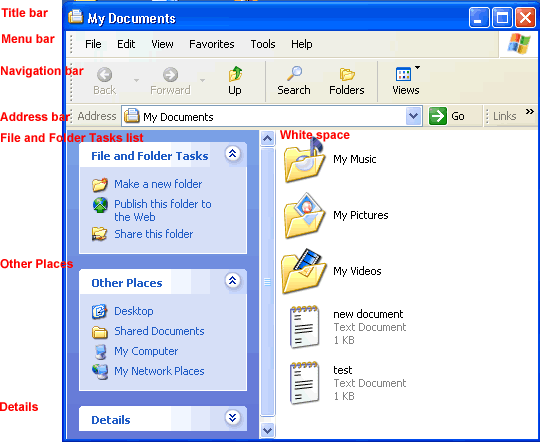

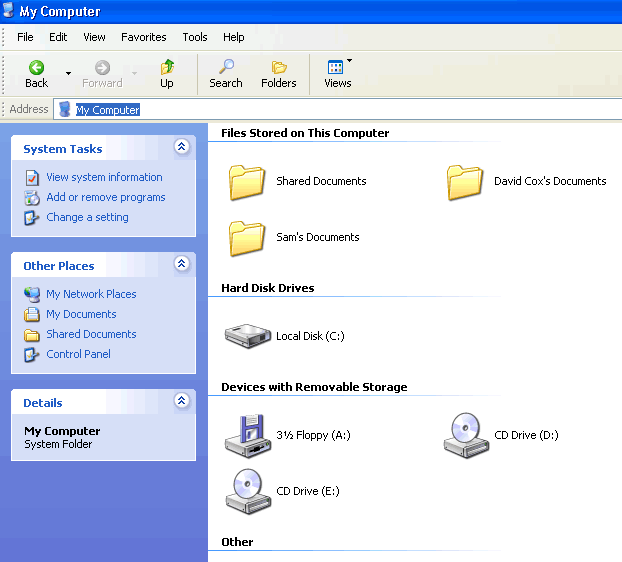
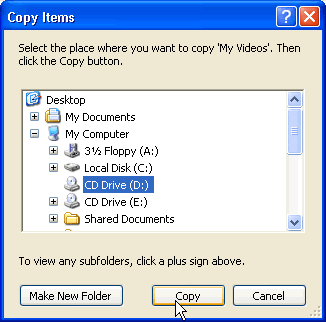
 Copy (Ctrl + C).
Copy (Ctrl + C). Paste (Ctrl + V).
Paste (Ctrl + V).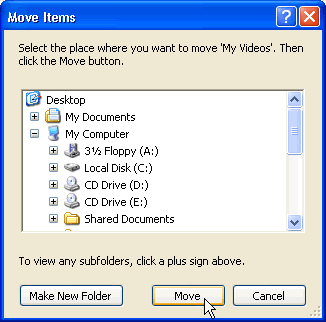
 Cut (Ctrl + X).
Cut (Ctrl + X). Paste (Ctrl + V).
Paste (Ctrl + V).